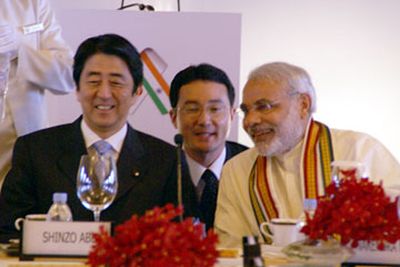Tokyo, Sep 2: Telling Japanese investors that there was no better place than India to set up their overseas enterprises, Prime Minister Narendra Modi Tuesday said: "I've come to assure you there is no red tape but only red carpet that awaits you in India."
 Delivering the keynote address at the Tokyo Stock Exchange, co-hosted by Japan External Trade Organization (Jetro), Modi said India was also the only place where the Japanese industry will pleasantly find all the three 'Ds" -- democracy, demography and demand.
Delivering the keynote address at the Tokyo Stock Exchange, co-hosted by Japan External Trade Organization (Jetro), Modi said India was also the only place where the Japanese industry will pleasantly find all the three 'Ds" -- democracy, demography and demand.
"I have come here to assure you that if you have to look anywhere outside Japan, you do not need to look here or there," he said, adding: "We particularly want to encourage and invite small and medium enterprises, as also small-scale industries."
The prime minister said India now has a government that is working on development and wants to step up manufacturing. He said he wished for India what he himself experienced when he was young when he did not have to think twice if a product said "Made in Japan".
Modi also recalled the major initiative launched by former prime minister Atal Bihari Vajpayee -- the Look East Policy -- to strengthen India-Japan relations and said it had now taken firm shape.
"Just as India is focusing on Look East policy, it seems Japan is now pursuing a 'Look at India Policy'," he said, adding India will strive to replicate the Japanese model of work culture so as to attract more Japanese investment.
According to the organisers, some 4,000 people had wanted to hear Modi speak at the event, hoping for an interaction as well, but only 2,000 could be accommodated.




Comments
Add new comment